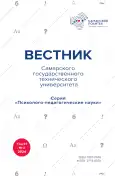Interactive online services for learning foreign languages
- Authors: Ageyenko N.V.1, Rybkina A.A.2
-
Affiliations:
- Samara State Technical University
- Samara Branch of Moscow City Pedagogical University
- Issue: Vol 21, No 2 (2024)
- Pages: 119-130
- Section: Higher school education
- URL: https://bakhtiniada.ru/1991-8569/article/view/260678
- DOI: https://doi.org/10.17673/vsgtu-pps.2024.2.8
- ID: 260678
Cite item
Full Text
Abstract
Modern educational standards implementation requires the development of new learning process strategies. Introduction of innovative methods and technologies in the educational process allows to increase the efficiency of students learning activity and to choose an individual trajectory in an open educational environment. The study substantiates the necessity of development linguacultural competence of higher school students in the process of learning a foreign language. The authors identify the basic principles and distinctive features of language training; analyze the system and approaches to form students’ foreign language communicative competence. The paper discusses the advantages of using online platforms of virtual museums for the purpose of the development of student’s linguistic-country competence in higher educational institutions. Broad educational potential of virtual museums as an innovative resource that complements the curriculum and expands the traditional learning system, offering students knowledge of culture in the context of various activities is taken into account. The research represents a brief description of the virtual museum application for classroom tours in the process of teaching students and the developed and tested model of the formation of linguistic-country competence.
Full Text
##article.viewOnOriginalSite##About the authors
Nataliya V. Ageyenko
Samara State Technical University
Author for correspondence.
Email: L-2402@yandex.ru
Cand. Ped. Sci., Associate Professor of Foreign Languages Department
Russian Federation, 244, Molodogvardeyskaya st., Samara, 443100Alla A. Rybkina
Samara Branch of Moscow City Pedagogical University
Email: rybkina_a_a@mail.ru
Cand. Ped. Sci., Associate Professor of Department of Methods of Teaching Foreign Languages
Russian Federation, 76, Stara Zagora st., Samara, 443086References
- Vereshchagin E.M., Kostomarov V.G. Yazyk i kul’tura: Lingvovedeniye i regionovedeniye v prepodavanii russkogo yazyka kak inostrannogo [Language and culture: Linguistic and regional studies in teaching Russian as a foreign language]. Metodicheskoye rukovodstvo. 4-ye izd., pererab. i dop. Moscow, Russkiy yazyk, 2010. 246 p.
- Tomakhin G.D. Teoreticheskiye osnovy lingvistiki i regionovedeniya (na osnove leksicheskikh amerikanizmov angliyskogo yazyka) [Theoretical foundations of linguistic and regional studies (based on lexical Americanisms of the English language)]. Moscow, 2004. 487 p.
- Ter-Minasova S.G. YAzyk i mezhkul’turnaya kommunikatsiya: uchebnik. [Language and intercultural communication: textbook]. Moscow, Slovo, 2000. 624 p.
- Tareva E.G. Mezhkul’turnoye inoyazychnoye obrazovaniye: lingvodidakticheskaya strategiya i taktika Kollektivnaya monografiya [Intercultural foreign language education: linguodidactic strategies and tactics Collective monograph]. Rep. editor E.G. Tareva. Moscow, Logos, 2020. 232 p.
- O’Malley J.M., Chamot A.U. Learning strategies in second language acquisition. Cambridge, UK: Cambridge University Press, 2019.
- Brianna D., Derrian R., Hunter H., Kerra B., Nancy C. Using EdTech to enhance learning. International Journal of the Whole Child. 2019. No. 4 (2). Рр. 57–63.
- Furmanova V.P. Mezhkulturnaya kommunikatsiya i ligvostranovedeniye v teorii i praktike obucheniya inostrannym yazykam [mikroforma] [Intercultural communication and cultural linguistics in the theory and practice of teaching foreign languages [microform]. Moscow, RSL, 2005. 122 p.
- Kirillova N.B. “Virtualnaya realnost” i “virtualizatsiya kultury” kak kontsepty sovremennoy kultury. Observatoriya kultury [“Virtual reality” and “virtualization of culture” as concepts of modern culture]. Observatoriya kul’tury. 2017. No. 5. Pр. 524–531.
- Vanyushkina L.M., Tikhomirov S.A. Muzey na peresechenii realnogo i virtualnogo mirov / Ekopoezis: ekogumanitarnye teoriya i praktika [Museum at the intersection of the real and virtual worlds]. Ekopoezis: ekogumanitarnyye teoriya i praktika. 2021. No. 1. https://cyberleninka.ru/article/n/muzey-na-peresechenii-realnogo-i-virtualnogo-mirov (accessed January 21, 2023).
- Yudkina E.S. Prosvetitelskiye vozmozhnosti virtualnyh muzeev [Educational capabilities of virtual museums]. Vestnik NASA. 2020. №1. https://cyberleninka.ru/article/n/prosvetitelskie-vozmozhnosti-virtualnyh-muzeev (accessed January 22, 2023).
- Gvazava V.I. Virtualny muzey v vuzovskom obrazovanii [Virtual museum in higher education]. Mir russkogo slova. 2014. No.3. Pр. 99–102.
- Intercultural Communication Skills You Need. https://www.skillsyouneed.com/ips/ladder-of-inference.html (accessed February 12, 2024).
- Basturkmen H. Developing Courses in English for Specific Purposes. Palgrave: Macmillan, London, 2010. 157 p.
- Sevil Büyükalan Filiz, Elif Anda. Evaluation of Business English Courses According to The English Teachers’ Views Teaching at Girls’ Technical and Vocational High Schools. American Journal of Educational Research. 2015. Vol. 3. No. 9. Pр. 1085–1090.
- Gruzdeva M.L., Vaganova O.I., Kaznacheeva S.N., Bystrova N.V., Chanchina A.V. Sovremennye obrazovatelnye tekhnologii v professionalnom obrazovanii. [Modern Educational Technologies in Professional Education]. Konspekty lektsiy po setyam i sistemam. 2020. No. 73. Рр. 1097–1103.









